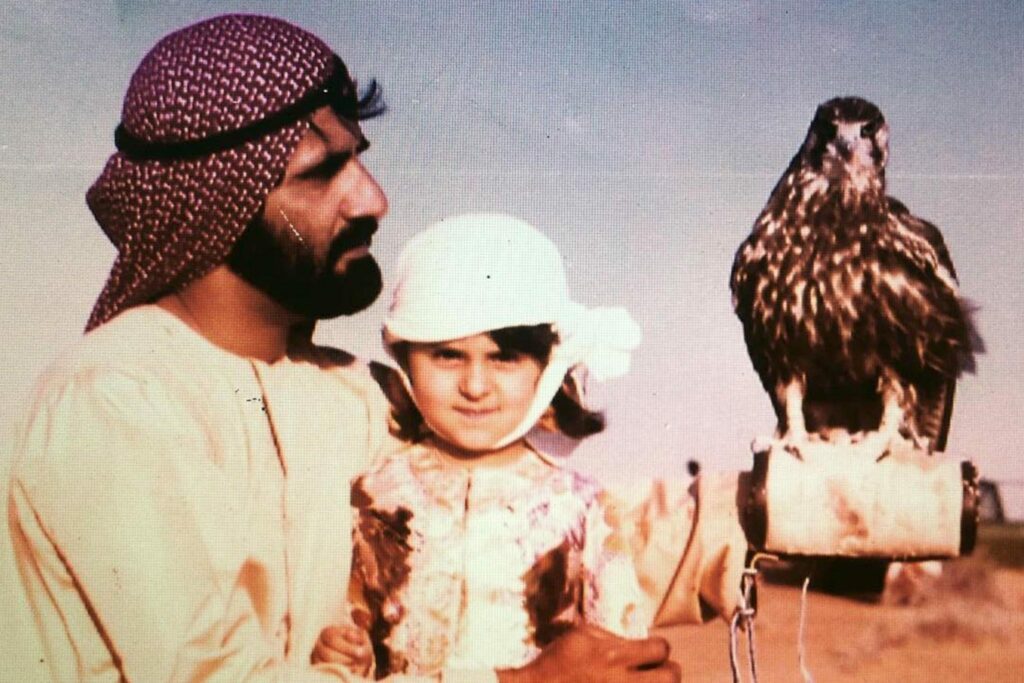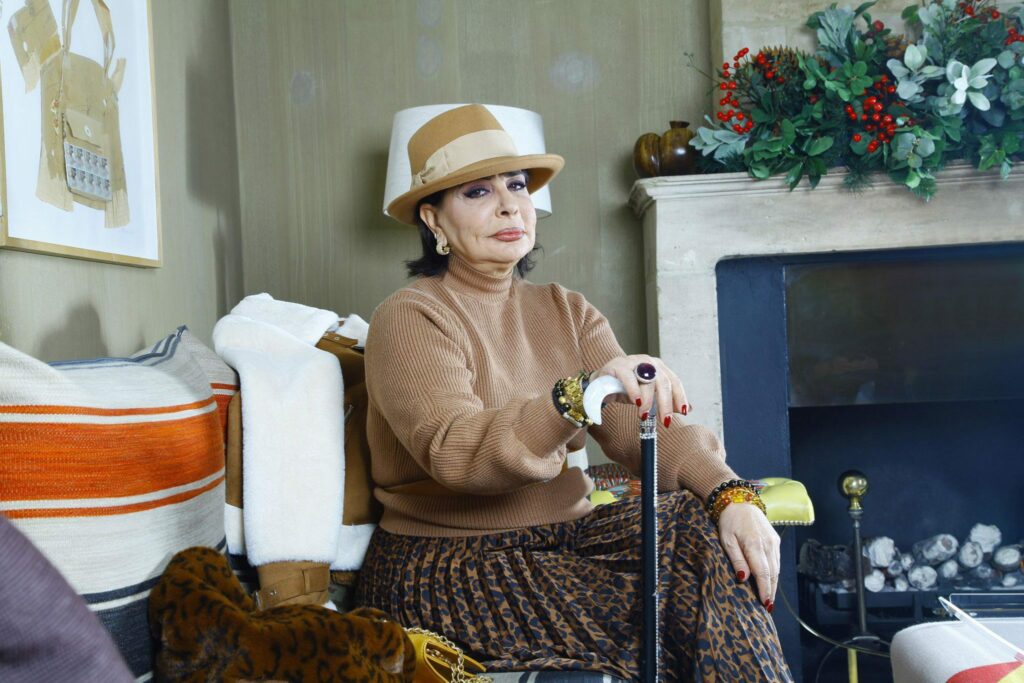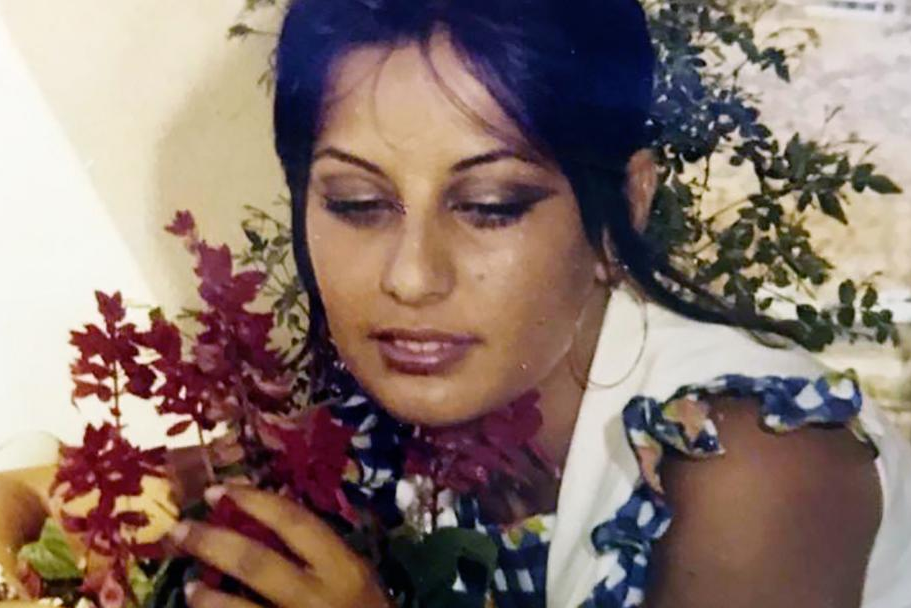The first wife of Dubai’s ruler says she was kicked out of the country when her marriage ended in the 1970s — and hasn’t seen her daughter since
Louise Callaghan
December 22, 2019, The Sunday Times
When Randa al-Banna met the prince, she had no idea who he was. It was 1972, she was 16 years old and she had just been expelled from a convent school in Beirut after scandalising the nuns with her naughtiness. Instead of reciting the catechism, she was whiling away the summer going to the beach and spending her nights dancing to the Bee Gees.
The vivacious Lebanese teenager was at a party in Beirut when she was introduced to Sheikh Mohammed bin Rashid Al Maktoum, prince of Dubai — a wealthy desert kingdom she had never heard of. After a brief courtship they were married and embarked on a life of private jets, champagne and parties at Tramp nightclub in London.
It would last only four years before Banna was back in Beirut — divorced, penniless and forcibly separated from her baby daughter. Now, at 64, she has come forward for the first time to tell the story of herself and the sheikh, now the ruler of Dubai, a close friend of the Queen and a regular at Ascot.
Her life has been extraordinary by any standards. After fleeing marriage into one of the richest royal courts in the Middle East, she was abducted and forced into another marriage by a fighter in the Lebanese civil war.
Speaking to The Sunday Times in the drawing room of a London hotel, Banna, dripping in jewels and majestically glamorous, told a story of deep unhappiness.
She revealed how she has spent decades desperately trying to make contact with her daughter, Manal, who is now in her forties.
Of Sheikh Mohammed, she said: “He is not an easy man. He is not. He is very stubborn. If he flips, he flips. I stayed away. I took my decision. I can’t see [Manal] now . . . I don’t know how she looks. I don’t know. I’m not allowed because I am the one who wanted to leave. So my punishment is that I don’t see her.
“[Sheikh Mohammed] deprived me of seeing my daughter, living my grandmother life. He’s not giving me the chance to go and see my grandchildren, the school of my grandchildren. This is unfair, really unfair — all this because I took the decision of leaving, being free. You wonder why it is that I wanted my freedom. Look what it’s costing me.”
She also told of how she was beaten and almost killed by an unknown assailant just before she was due to travel secretly to Dubai to attend Manal’s wedding. She bears a heavy scar from the incident.
Her claims follow recent, rare breaches of the Dubai royal family’s tightly closed world — including a custody battle with Sheikh Mohammed’s sixth wife, Princess Haya, in the London courts.
For decades, Banna has kept the Maktoum family’s secrets in the hope that by staying silent she would be allowed to see her daughter, who grew up to be one of the most prominent women in the Middle East and is now married to Sheikh Mansour, the deputy prime minister of the United Arab Emirates.
She finally decided to tell her story, she said, after hearing of the alleged kidnap and abuse of Shamsa and Latifa, two of Sheikh Mohammed’s daughters from later marriages, after they attempted to escape from the family. Both are believed to be in the emirates under heavy guard.
Sheikh Mohammed, through his representatives, has not taken up an invitation to comment.

Today Banna is in poor health and extremely concerned that she, or her other children from later marriages, may face retaliation for speaking out. She has spent more than a decade putting together her memoirs, which she hopes to publish.
More than anything, she says, she wants her daughter to know that she loves her — and that she did not want to leave her behind all those years ago.
In 1972 it all looked very different. Then, the 16-year-old Banna — pleased to have been dismissed from her dull convent school, where she was regularly punished by being forced to kneel on two olives — was dancing at a friend’s engagement party.
“Lebanon was the Switzerland of the Middle East,” she said, taking a puff on an e-cigarette. “Life was so easy going to the beach.”
A young man interrupted her dancing to tell her that the son of the ruler of Dubai wanted to speak to her. Banna wasn’t impressed. The daughter of a Lebanese politician, she had never heard of Dubai and thought the prince’s royal name too long to remember.
“I said, ‘If he wants to talk to me he can come to me,’ ” she said. “I wanted to dance and he was disturbing me.”
After a while the prince came over to talk and they spoke briefly. Two days later he was at her parents’ house, with an enormous entourage, asking for her hand in marriage.
Her family were unsure at first, but after a few months of speaking on the phone, Banna was falling in love with him. They signed an Islamic marriage contract and her life changed for ever. “He was nice. He was good-looking back then. I don’t know. I was . . . I was stupid, you know. He showed me a life that I didn’t think exists like this,” she said. “For someone my age, it was something.”
The young couple lived in London for some time, before travelling to Dubai, where Banna, a Beiruti Francophone sophisticate, was unimpressed by the lack of amenities and the Bedouin culture to which her husband was so attached.
He wrote her screeds of poetry in classical Arabic, none of which she understood. His family insisted that she change her name — which they saw as too European — to Haifa.
“When we went to his country, he said, ‘What’s wrong?’ I said, ‘What do you mean? There’s nothing.’ It was desert,” she said.
Her outspokenness upset him. “I couldn’t keep anything inside me. I didn’t think, like, ‘You’re talking to a royal, you have to behave’.”
Despite this, they were in love. They partied at their friends’ houses and at Dubai’s one hotel. When she realised she was pregnant, they were both overjoyed. She was 18 years old and gloriously happy when she gave birth to her daughter.
Soon it would all come crashing down. On a short visit to her family in Beirut soon after Manal’s birth, she was told of an alleged incident involving the sheikh that had occurred during her pregnancy. He denied it but Banna demanded a divorce.
Today she does not know the truth of what had happened. But then, young and furious, she ended up back in Beirut — blocked, she said, from bringing five-month-old Manal with her.
“It was very hard,” she said. “Since then, I lost my family. I didn’t want to talk to any one of them. I lost him, I lost my house, I lost my daughter, I lost my dignity, I lost my pride. I lost everything. I paid the price of love.”
That was not the only life-changing moment. Lebanon was sinking into political violence and civil war. One day at a checkpoint in Beirut she was kidnapped. Her abductor, a “very handsome” but abusive militia leader, forced his beautiful captive into marriage.
Her extraordinary life with him over the following years, as she described it, ranged from the tempestuous to the outright brutal. She bore him two children but he often threatened to kill her, she said, and shot her in the leg for putting her feet on the table.
Once, he cut off her long hair because another man had praised it. Whenever she asked for a divorce, he would tell her that the only way she would leave was in a coffin.
“He would always take out 60 [Lebanese] lira and wave it at me and say, ‘There, that’s your divorce — that’s how much it would cost me to bury you,’ ” she said.
After the civil war, which ended in 1990, she says she got her revenge. She denounced her husband to the authorities and offered information on the location of arms caches. They raided the properties and arrested him.
In return, she said, she and her two children by the militia leader were allowed safe passage to Italy, where she lives today. On her way to the airport in Beirut, she stopped off at the prison where he had been locked up.
“I told the guard, ‘I want to see my husband. Please bring him out — I want to see him,’ ” she said, luxuriating in the memory. “When he came, I took out 60 lira and I threw it at him. I said, ‘You might need this now.’ ” He was assassinated a few years later.
Sheikh Mohammed, she said, had helped to pay for a lawyer for her divorce from her second husband. Once she was free, she renewed her efforts to contact Manal, begging the sheikh to let them meet. She claims he repeatedly made promises that were not fulfilled.
“We stayed in contact because I always wanted to check on her. He promised me, ‘I will bring her — I will let you see her. You will see her in Harrods at Christmas. No, we couldn’t make it. Let’s make it on Easter. Let’s make it in Eid.’ Promises. A life has gone. All life,” she said.
She said the sheikh had given her a photo of Manal as a toddler, the only picture she had of her daughter. Years later, she realised it wasn’t of Manal at all but of another of his children.
“I loved a photo that wasn’t of my daughter. I knew her. I hugged her,” she said.
In 2000, she and an Italian friend travelled to Dubai and called the sheikh, demanding to see her daughter. He agreed, she claimed, and gave her an address, asking her to come there dressed in her finest clothes.
That night, she said, she went to meet the sheikh at an event to mark the end of the Dubai air show, attended by thousands of people.

“I said, ‘Where is she?’ ” Banna recalled. “He said, ‘Inside. Try to recognise her. I’m going to see the instinct of the mother.’ ”
Banna searched the hall for her daughter, looking among the hundreds of women, but concluded she was not there. The next day Banna left Dubai and has, she says, been banned from the country since then.
“Do you know what is the reason of my ban?” she said. “I am dangerous to security. Me, the mother of his daughter. Imagine.”
Undeterred, she tried to return to Dubai in 2005 for Manal’s wedding — planning to travel incognito in the entourage of a friend, a Saudi princess. But just days before she was set to leave, she was attacked in Beirut by a man wielding a baseball bat.
The brutal assault was another life- altering moment. A long wound, starting by her temple and going back over her skull, took 27 stitches to close. Four of her vertebrae were broken.
When she woke up, she said, the sheikh was at her bedside — giving his condolences and offering to pay for her treatment. She was very afraid.
“I said, ‘What did I do to harm you that much?’ He said, ‘Are you crazy? You’re my family. I would never hurt you.’ ”
A metal cage with eight screws was inserted into her torso, and for years afterwards she was forced to use a wheelchair. While her own drama was unfolding, another extraordinary episode was putting the spotlight on the Dubai royal family.
Almost 20 years ago, another of Sheikh Mohammed’s daughters, Sheikha Shamsa, then a teenager, ran away from the family’s sprawling estate in Surrey. She is thought to have wanted to escape the stultifying strictures of royal life. Instead, she was captured weeks later and sent back to Dubai.
Little more was heard from Shamsa. Last year, however, her story was cast into the spotlight when her younger sister, Latifa, published a video alleging that the pair had been imprisoned and tortured after trying to run away years earlier. Latifa made the video, she said, because she would be trying to escape again. It should be published only if she did not make it to freedom.
In March 2018, Latifa tried to escape Dubai on a yacht, helped by a Finnish friend, Tiina Jauhiainen, and another accomplice. They sailed for days across the Arabian Sea and had almost reached India when, Jauhiainen claims, they were intercepted by Emirati and Indian special forces, who kidnapped Latifa and took her back to Dubai.
The Dubai royal court issued a statement a year ago saying that Latifa was safe at home, and photographs were released showing her with Mary Robinson, the former Irish president and former UN high commissioner for human rights. Latifa has not been heard from since.
For Banna, watching the story unfold from afar, it was too much to bear, and it made her determined to go public herself. “After my story, when I heard [the video released by Latifa before her attempted escape], I was crying. I said, ‘He did it to me too, when I didn’t harm him. All I did was say I cannot continue,’” she said. “When the Latifa story came out I texted him so many times, saying, ‘You’re the father. You can’t do this — she’s a piece of you.’ He never replied.”
David Haigh, a human rights lawyer who represents Latifa, thanked Banna last week for her support. “Latifa’s heart would be lifted to know that so many members of her own family are speaking up and requesting her freedom,” he said.
Banna now fears the repercussions of speaking out. “What did I do to deserve this punishment?” she said.
“If he shows me my daughter, that will repay everything. I just want to hold her in my arms again.”
